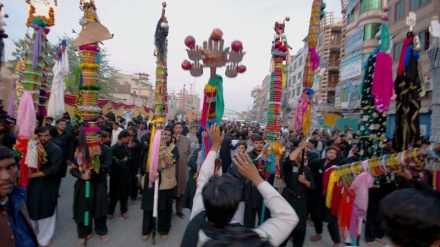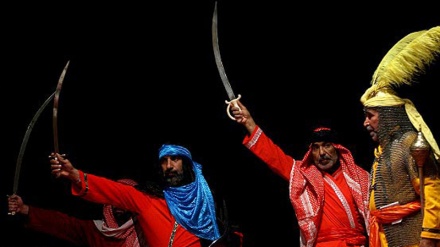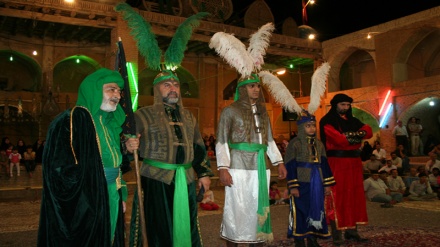Muharram mourning traditions in different lands - 5
Today, we focus on the Prophet’s city Medina, the hometown of the Martyr of Karbala, which was engulfed in grief and mourning when news reached about the martyrdom of the Prophet’s grandson and the tragedy that befell the noble ladies and children of the Prophet’s Blessed Household, the Ahl al-Bayt.
According to reliable accounts, Prophet Mohammad (SAWA), had given to one of his wives named Omm Salamah some sand to be kept in bottle, saying it was the soil from Karbala in Iraq, and would change colour if and when Imam Husain (AS) was martyred in that land. Over five decades later when Imam Husain (AS) was forced to leave Medina and after a stay of four months in Mecca had travelled to Iraq on the invitation of the people of that land to deliver them from the Godless rule of the self-styled caliph Yazid, it was the habit of an anxious and worried Omm Salamah to have a look at the sand in the bottle every day, and then thank God that nothing untoward had happened. On the fateful day of Ashura, or the 10th of Muharram, 61 AH, when as usual she cast a look at the bottle, to her horror, the sand had turned into blood. She raised the cry of “Ya Husain” or “O Husain” and started beating her chest, saying the prophecy of the Prophet of God about the martyrdom of Imam Husain (AS) had come true.
The account of Omm Salamah regarding the martyrdom of Imam Husain (AS) is also found in the authoritative books of hadith of our Sunni brethren, especially Sahih Bukhari and Sunan Tirmizi. It is mentioned that on the 10th of Muharram she woke up from sleep and started crying and beating her chest, saying the Prophet had appeared in her dream with hair disheveled, dust on his head, and tears flowing down his eyes. Omm Salamah says that in her dream when she asked the Prophet the reason for his profound grief, he replied that he was in Karbala by God’s permission and had witnessed the heartrending scene of the martyrdom of his grandson, Imam Husain (AS).
When the news arrived in Medina of the tragedy that befell the Prophet’s Household in Karbala, Omm al-Baneen, the widow of the Commander of the Faithful, Imam Ali ibn Abi Taleb (AS), gathered the women of Medina in her house and all cried for the martyrdom of Imam Husain (AS). This was the first ever formal and organized Majlis-e Aza or Mourning Assembly for the Martyrs of Karbala. Omm al-Baneen had such sincerity toward the Prophet's progeny that she held Imam Husain (AS) in high esteem, and loved him more than her own four sons, including Hazrat Abbas (AS).
It was to the extent that when she received the news stating the martyrdom of her four children, she said: “Tell me about Husain (AS) and when the messenger said he was martyred, she said: "All arteries of my heart are torn; may all my children and whatever that exists under this azure heaven be sacrificed for the sake of Imam Husain (AS). After the tragedy of Karbala, Omm al-Baneen undertook the role of publicizing the event in Medina by holding regular gatherings in her house to convey the message of the noble martyrs, and thereby perpetuating the path of Imamate through her sermons, elegies, and lamentation. Even though all her four sons were martyred in Karbala, she used to first recite to the mourning assemblies the tragedies afflicting Imam
Husain (AS) and then the death of her own four sons who were martyred with him.
Omm al-Baneen was an eloquent poet, and she composed moving elegies on the tragedy of Karbala. She would tell the ladies of Medina in verses:
“Do not call me Omm al-Baneen and do not know me as the mother of lions anymore. I had some sons, because of whom I was called Omm al-Baneen. But now there is no son left for me and I have lost all of them. Yes, I had four sons, who were riddled with arrows and whose jugular veins were cut. The enemies slashed their pure bodies with spears, and severed bodies.
“If only I could know if it is true that they cut off the arms of my son, Abbas?
Ah, the one who saw Abbas attacking like his father fighting the cowardly enemies! Ah, the one who saw Ali’s other sons, each of whom was like a hunting lion – fighting around him!
“I was informed that my son Abbas was hit with a metal stick on his head while his arms had been already cut off. Oh my son, Abbas! If your arms were not cut off and you had a sword in your hand, no one would dare to approach you.”
The people of Medina would gather in the sacred Cemetery of Jannat al-Baqi to listen to her elegies and discourses about the martyrdom of Imam Husain (AS). This was so touching that even the Omayyad governor, Marwan ibn Hakam– despite being an enemy of the Prophet’s Household – was moved to tears by Omm al-Baneen’s lamentation.
A main feature of her elegies was her awareness of the then political events and relevant affairs, through which she would convey the message of the oppressed martyrs of Ashura to the audiences. She also could awaken the unaware people to the truth through her art of reciting elegies of the martyrs of Karbala.
MD/AS/SS


